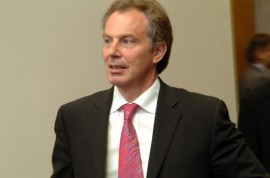
The analysis of the Middle East crisis set out in Tony Blair’s speech in Los Angeles seems to me to be confused, distracted, even almost deranged. Read the speech here, and see for yourself.
I will substantiate my views, of course, but first things first. The speech was spun as representing a change in policy. Was it really?
On the immediate crisis in Lebanon, he said:
“We will continue to do all we can to halt the hostilities. But once that has happened, we must commit ourselves to a complete renaissance of our strategy to defeat those that threaten us.”
So the fighting stops and then a permanent solution is found. Previously, the view was that the fighting stops when a permanent solution has been found: the fighting should not be halted temporarily. So, if he means it, that’s a change in policy. But does he mean it? Let’s wait and see what he says next. (Margaret Beckett appears still to be on her caravan tour of France.)
But I am more interested in the longer term issues than the short term ones here today. Because that’s where Tony Blair’s analysis goes quite loopy. We start with this:
“I am amazed at how many people will say, in effect, there is increased terrorism today because we invaded Afghanistan and Iraq. They seem to forget entirely that September 11 predated either.”
This is a non sequitur. The complaint is that the invasion of Iraq increased terrorism, not that it started it. At present, as many people are being killed in violence in Iraq each month as died on 11 September 2001. Prior to the invasion in March 2003, the situation in Iraq was unacceptable but it was stable. It is still unacceptable, but it isn’t even stable any more. And democracy and order will not be possible until some kind of stability returns first.
Tony Blair gets into all kinds of contortions to try and explain what is going on, when he has to do so without mentioning the basic fact that the botched invasion of Iraq has made many things a whole lot worse.
Even worse, there is his description of the balance of forces within Islam, between those he calls the “moderates” and the “extremists”. Yes, there is a totalitarian strain of Islamism that exults in terrorism, and yes, we must confront it rather than give in, but Saddam Hussein was no part of that movement. He was exactly the kind of secular materialist Arab leader they despised: indeed, they attempted to assassinate him. It is quite wrong to treat the Taleban in Afghanistan and the Ba’athists in Iraq as though they were one and the same. The disastrous blunders in Iraq since 2003 have undoubtedly strengthened the Islamist cause, but the one person who cannot admit this is the person responsible.
More expert theologians than me can explain the reasons for the division between the extremists and the moderates. That seems to me to be quite important in deciding how to meet Tony Blair’s call “to empower moderate, mainstream Islam to defeat reactionary Islam.” The ways in which non-Muslims can do this might well be quite limited.
And of course, one specific and important request by moderate Muslim governments such as Turkey and Egypt – namely not invading Iraq – was ignored. (Maybe this is another change of policy, but I doubt it.)
I could go further. He calls on Syria and Iran to “come in to the international community and play by the same rules as the rest of us;” are these the same rules of the international community that permit Gordon Brown to announce a new generation of British nuclear weapons? The Iranians are at least entitled to ask.
But, let’s be charitable. Let’s look for the good in this speech. And there is something important to point out.
Tony Blair concludes with an appeal to the “values” that he says are at stake. I like the idea that values matter in politics. This is his attempt to define them:
“Though left and right still matter in politics, the increasing divide today is between open and closed.”
This is clarified as meaning:
“Is the answer to globalisation, protectionism or free trade? Is the answer to the pressure of mass migration, managed immigration or closed borders? Is the answer to global security threats, isolationism or engagement?”
When I read these phrases, I was reminded of something from the Ventotene Manifesto:
“Therefore, the dividing line between progressive and reactionary parties no longer coincides with the formal lines of more or less democracy, or the pursuit of more or less socialism, but the division falls along a very new and substantial line: those who conceive the essential purpose and goal of struggle as being the ancient one, the conquest of national political power … and those who see the main purpose as the creation of a solid international State”
(Forgive the length of the quote, but Altiero Spinelli did not really deal in soundbites.)
He’s right: establishing the right kind of international political order is indeed an objective in its own right, and not merely the adjunct of some other kind of politics.
And Tony Blair goes further:
“But I also believe that the stronger and more appealing our world-view is, the more it is seen as based not just on power but on justice, the easier it will be for us to shape the future in which Europe and the US will no longer, economically or politically, be transcendent.”
Even better. But what are the steps to make this vision a reality? If he says one thing, but continues to do the opposite, he will continue to disappoint, if not worse.
